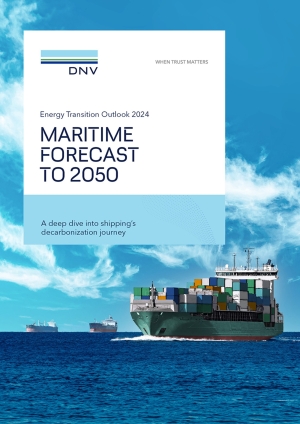


(Posted on 03/09/24)
Reaching shipping’s 2030 decarbonization goal of 20% emission reductions, set by the International Maritime Organization (IMO), will not happen without significant energy savings, according to DNV's latest Maritime Forecast to 2050. The report stresses that, until carbon-neutral fuels become viable, prioritizing the development and use of technologies that reduce energy consumption is crucial for lowering shipping’s emissions.
To reach IMO’s 2030 decarbonization goals shipping will need between 7 and 48 Mtoe of carbon-neutral fuels. However, with the global cross-sector production of carbon-neutral fuels expected to reach only between 44 and 63 Mtoe by 2030, it will be near impossible for shipping to secure its required share. As regulations like the EU Emissions Trading System (ETS) and FuelEU Maritime start to impose costs on emissions, shipowners and managers must therefore explore every option to reduce fuel consumption.
Knut Ørbeck-Nilssen, DNV Maritime CEO, said: "While we are currently witnessing a slowdown of decarbonization in shipping, we are entering an era of unprecedented technological exploration that will drive progress forward. With carbon-neutral fuels in short supply, smart decision-making and strategic investments today are crucial to lay the foundations for future emissions reductions. Prioritizing energy efficiency, leveraging technological solutions, and embracing digitalization are key steps towards reducing the extra cost burden and achieving our decarbonization goals."
The eighth edition of DNV’s Maritime Forecast to 2050 provides an updated outlook on regulations, drivers, technologies and fuels needed for maritime decarbonization, including four scenarios exploring conditions that could accelerate the adoption of specific fuels and technologies by 2050. The report emphasises that regardless of which direction the industry’s decarbonization journey takes, it will come at a significant cost. The four simulated scenarios project these cost increases per transport work; with estimates ranging from 69-75% for bulk carriers, 70-86% for tankers, and 91-112% for container vessels.
“Our latest analyses show that decarbonizing shipping could double the cost of transporting goods by containers”, said Eirik Ovrum, Principal Consultant and Lead Author of Maritime Forecast to 2050. “Ultimately, the rising costs of seaborne transport will need to be passed down the value chain and the market is already seeing trends towards shifting these costs to end-users. To remain competitive, shipowners must develop and execute strategic fleet management plans."
According to the report, reducing energy losses is the most straightforward way for the global fleet to cut emissions. Operational and technical energy efficiency measures can reduce fuel consumption by between 4 and 16% by 2030. Reducing energy consumption by 16% for the world fleet would save 40 Mt of fuel and 120 MtCO2 emissions, which would be equivalent to operating the 55,000 smallest ships or the 2,500 largest ships with carbon-neutral fuel.
Finally, the report emphasises the increasingly important role digitalization plays in complementing operational and technical energy efficiency measures.
AtoB@C Shipping, a subsidiary of ESL Shipping, has announced the successful delivery of Fleximar, the... Read more
Western Bulk, together with reputable Norwegian partners A/S J. Ludwig Mowinckels Rederi, Premium Maritime... Read more
Pacific Basin Shipping Limited, one of the world’s leading dry bulk shipping companies, has announced... Read more
Columbia Group anticipates a period of strong expansion as an increasing number of international shipowners... Read more
Norse?Ship Management has expanded its use of Smart Ship Hub’s high frequency sensor data and... Read more
As the maritime industry gears up to welcome the IMO’s STCW bullying and harassment training amendments... Read more
NORDEN has acquired the cargo activities of Taylor Maritime in Southern Africa (previously operated... Read more
Philippos Ioulianou, Managing Director of EmissionLink, has warned the IMO’s decision to delay... Read more
VIKAND has highlighted the need for cultural change in the maritime sector as reports of bullying, harassment... Read more
The maritime industry is experiencing a period of significant transformation, driven by rapidly evolving... Read more